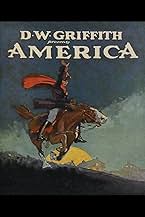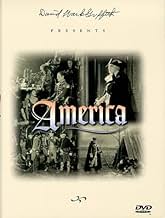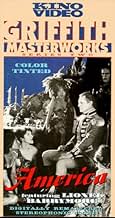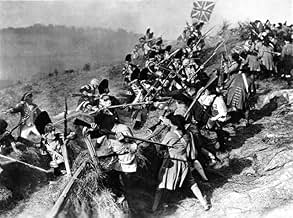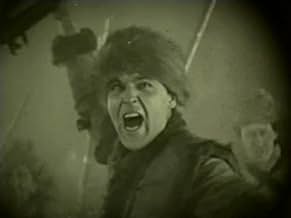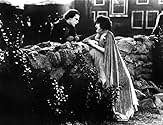Añade un argumento en tu idiomaThe story of a family caught up in the American Revolutionary War.The story of a family caught up in the American Revolutionary War.The story of a family caught up in the American Revolutionary War.
- Dirección
- Guión
- Reparto principal
- Premios
- 1 premio en total
Lucille La Verne
- A Refugee Mother
- (as Lucile La Verne)
Paul Doucet
- Marquis de Lafayette
- (as H. Paul Doucet)
Reseñas destacadas
I waited until the 4th of July to write this because . . . well . . . because it just feels right to be doing it on this day.
In 1924 D.W. Griffith needed a hit, he had not had a big one since ORPHANS OF THE STORM (1921). He'd been working steadily since then but his movies had been smaller in scope and had failed to hit the right chord with audiences. He was planning a film about Patrick Henry when he was contacted by members of the Daughters of the American Revolution (DAR) who asked if he might expand his ideas to encompass more of the American Revolution. This movie is the result. By the time he had finished he had a 14 reel history lesson and there wasn't a trace of Patrick Henry anywhere.
We all know the story of the Revolutionary War but Griffith threw in a love story with Patriot farmer Nathan (Neil Hamilton) falling in love with Tory aristocrat Nancy Montague (Carol Dempster, a leading lady for Griffith for many years). Complicating matters is the fact that Nancy's father hates Nathan . . . well not just Nathan, he hates all rebels. It does not help matters when, during a skirmish on the streets of Lexington someone jostles Nathan's arm causing him to discharge his gun and accidentally wound Nancy's dad!
Paralelling the love story is the (mostly true but partially embellished) story of Capt. Walter Butler (Lionel Barrymore) a renegade British officer who feels he owes allegiance to no one. With Thousands of Indians form the Six Nations on his side he hopes to crush the colonials and become monarch of his own empire.
Comparisons with BIRTH OF A NATION (1915) are inevitable. The Montague family might just as well be the Cameron's from the earlier film while Nathan could be a part of the Stoneman family. The sequence of the Battle of Bunker Hill is staged very similarly to a scene in BIRTH OF A NATION with the attacking army, in this case the Redcoats, storming a trench packed with Patriots. The only thing missing is Henry Walthall charging across No Man's Land to stuff a flag into the muzzle of a cannon. Amazingly enough the battle scenes in America seem to lack the energy of the battle scenes in BIRTH and fail to draw the audience in. Something is clearly missing. It isn't scope, G.W. "Billy" Bitzer's camera work is quite good. Maybe what is missing is . . . dare I say it . . . sincerity?
The brutality of Capt. Butler and his men is well underscored although much of it happens in long shot or offscreen. Don't expect any heads to be lopped off in closeup like we saw in INTOLERANCE (1916). In one scene Butler's second in command, Capt. Hare (Louis Wolhiem) gouges out the eyes of a captive colonist. We see only the beginning of the deed, for the remainder the camera focuses on Hare's face as he obviously has a good time doing this. Lionel had been working with Griffith on and off since 1912. A story goes that he approached Griffith for work and D.W., knowing the reputation of his famous family, said "I am not hiring stage actors." to which Lionel replied "And I am nothing of the kind, sir!" He makes a very good and quite believable villain. Louis Wolhiem appeared with Lionel's older brother John three times; in SHERLOCK HOLMES and DR. JEKYLL AND MR. HYDE (both 1920) and later in THE TEMPEST (1927). As Capt. Hare his wild staring eyes and disheveled hair not only mark him as a villain but make you think he is quite mad also.
Neil Hamilton later remarked that America was his first time on horseback and "I was scared to death.". He hides his displeasure very well though and we can believe he was quite the equestrian by the time shooting was over. Mr. Griffith was very much in love with Carol Dempster and at one point asked her to marry him. She refused and soon left his stock company, after which her star status gradually waned.
Speaking of horses, one accidentally amusing moment which had to be unscripted came during the depiction of Paul Revere's ride. He rides his horse right up on the front porch of a family to announce "To arms! The Regulars are coming!" but as he tries to leave the horse cannot negotiate the steps backwards and stumbles spilling his rider on the ground! I am amazed Griffith did not do another take.
So is America a classic? YES! Don't wait for July 4th to see it, it is enjoyable anytime.
In 1924 D.W. Griffith needed a hit, he had not had a big one since ORPHANS OF THE STORM (1921). He'd been working steadily since then but his movies had been smaller in scope and had failed to hit the right chord with audiences. He was planning a film about Patrick Henry when he was contacted by members of the Daughters of the American Revolution (DAR) who asked if he might expand his ideas to encompass more of the American Revolution. This movie is the result. By the time he had finished he had a 14 reel history lesson and there wasn't a trace of Patrick Henry anywhere.
We all know the story of the Revolutionary War but Griffith threw in a love story with Patriot farmer Nathan (Neil Hamilton) falling in love with Tory aristocrat Nancy Montague (Carol Dempster, a leading lady for Griffith for many years). Complicating matters is the fact that Nancy's father hates Nathan . . . well not just Nathan, he hates all rebels. It does not help matters when, during a skirmish on the streets of Lexington someone jostles Nathan's arm causing him to discharge his gun and accidentally wound Nancy's dad!
Paralelling the love story is the (mostly true but partially embellished) story of Capt. Walter Butler (Lionel Barrymore) a renegade British officer who feels he owes allegiance to no one. With Thousands of Indians form the Six Nations on his side he hopes to crush the colonials and become monarch of his own empire.
Comparisons with BIRTH OF A NATION (1915) are inevitable. The Montague family might just as well be the Cameron's from the earlier film while Nathan could be a part of the Stoneman family. The sequence of the Battle of Bunker Hill is staged very similarly to a scene in BIRTH OF A NATION with the attacking army, in this case the Redcoats, storming a trench packed with Patriots. The only thing missing is Henry Walthall charging across No Man's Land to stuff a flag into the muzzle of a cannon. Amazingly enough the battle scenes in America seem to lack the energy of the battle scenes in BIRTH and fail to draw the audience in. Something is clearly missing. It isn't scope, G.W. "Billy" Bitzer's camera work is quite good. Maybe what is missing is . . . dare I say it . . . sincerity?
The brutality of Capt. Butler and his men is well underscored although much of it happens in long shot or offscreen. Don't expect any heads to be lopped off in closeup like we saw in INTOLERANCE (1916). In one scene Butler's second in command, Capt. Hare (Louis Wolhiem) gouges out the eyes of a captive colonist. We see only the beginning of the deed, for the remainder the camera focuses on Hare's face as he obviously has a good time doing this. Lionel had been working with Griffith on and off since 1912. A story goes that he approached Griffith for work and D.W., knowing the reputation of his famous family, said "I am not hiring stage actors." to which Lionel replied "And I am nothing of the kind, sir!" He makes a very good and quite believable villain. Louis Wolhiem appeared with Lionel's older brother John three times; in SHERLOCK HOLMES and DR. JEKYLL AND MR. HYDE (both 1920) and later in THE TEMPEST (1927). As Capt. Hare his wild staring eyes and disheveled hair not only mark him as a villain but make you think he is quite mad also.
Neil Hamilton later remarked that America was his first time on horseback and "I was scared to death.". He hides his displeasure very well though and we can believe he was quite the equestrian by the time shooting was over. Mr. Griffith was very much in love with Carol Dempster and at one point asked her to marry him. She refused and soon left his stock company, after which her star status gradually waned.
Speaking of horses, one accidentally amusing moment which had to be unscripted came during the depiction of Paul Revere's ride. He rides his horse right up on the front porch of a family to announce "To arms! The Regulars are coming!" but as he tries to leave the horse cannot negotiate the steps backwards and stumbles spilling his rider on the ground! I am amazed Griffith did not do another take.
So is America a classic? YES! Don't wait for July 4th to see it, it is enjoyable anytime.
Slow but beautifully-mounted story of the American revolution. Griffith's story-telling seems a lot less heavy-handed than in his earlier historical epics and his tableaux work is fully integrated into the action. Lionel Barrymore is an utter swine, Neil Hamilton is poor but dashing and Carol Dempster is.... well, Carol Dempster is most of what is wrong with Griffith in this period, but she doesn't show up often enough to slow the pace and drama.
Note that the trivia for this movie says it came in originally at slightly more than 2 hours when first released, but that no cut exists that runs longer than 90 minutes. However, the dvd release has been presented at a slower fps rate that increases the tension and brings it back to a bit over two hours.
Far better in terms of story-telling than sound versions, such as THE PATRIOT. While not quite in the league of Griffith's best, such as WAY DOWN EAST and BROKEN BLOSSOMS, an excellent way to spend a couple of hours.
Note that the trivia for this movie says it came in originally at slightly more than 2 hours when first released, but that no cut exists that runs longer than 90 minutes. However, the dvd release has been presented at a slower fps rate that increases the tension and brings it back to a bit over two hours.
Far better in terms of story-telling than sound versions, such as THE PATRIOT. While not quite in the league of Griffith's best, such as WAY DOWN EAST and BROKEN BLOSSOMS, an excellent way to spend a couple of hours.
Appropriately subtitled "Love and Sacrifice", director D.W. Griffith's fictionalized account of revolutionary "America" should have been more successful, given the obvious costly effort in evidence; it is weighted down by lack of imagination, and a significantly unsuitable performance from the leading actress. Still, it offers many worthwhile scenes; and, some legendary scenes are brought beautifully to life. Griffith gentlemanly reveals prejudices early, explaining, "The story of the sacrifice made for freedom in the American Revolution is that of a civil war between two groups of English people; one group, the Americans, being merely Englishmen who settled on the American Continent."
Moreover, Griffith asserts, "The government which Canada and Australia now enjoy was absolutely denied to America through the stubborn and false ideals of the autocratic powers guiding the hand of King George the Third." During the running time, Griffith uses Royalist Walter Butler to represent the evil on the other side of the Atlantic Ocean. Were it not for Mr. Butler, the Revolution might have been settled amicability! Not as despicable a thesis as presented Griffith's similarly plotted Civil War epic, but neither is "America" as excitingly presented as "The Birth of a Nation".
And, try as they might, Neil Hamilton (as Nathan Holden) and Carol Dempster (as Nancy Montague) are not Robert Harron and Lillian Gish in "Hearts of the World".
Griffith's epics are much more convincing with when characterizations and relationships are well presented. Mr. Hamilton, as the poor young New Englander, has no rapport with Ms. Dempster. And, as the Virginia belle, Dempster is wrongly directed. Compare Dempster/Hamilton with Gish/Harron in "Hearts of the World". Or, even better, with Gish/Harron in "A Romance of Happy Valley". The later film shows how well Ms. Gish and Mr. Harron played the "bedroom window" scene which Griffith re-visits in "America". Hamilton, a promising actor, had a great career highlight, later, as "Commissioner Gordon" of "Batman" in the 1960s; but, ribald Lionel Barrymore (as Butler) steals the acting honors. Griffith used his stars better in the forthcoming "Isn't Life Wonderful?"
****** America (2/21/24) D.W. Griffith ~ Neil Hamilton, Carol Dempster, Lionel Barrymore
Moreover, Griffith asserts, "The government which Canada and Australia now enjoy was absolutely denied to America through the stubborn and false ideals of the autocratic powers guiding the hand of King George the Third." During the running time, Griffith uses Royalist Walter Butler to represent the evil on the other side of the Atlantic Ocean. Were it not for Mr. Butler, the Revolution might have been settled amicability! Not as despicable a thesis as presented Griffith's similarly plotted Civil War epic, but neither is "America" as excitingly presented as "The Birth of a Nation".
And, try as they might, Neil Hamilton (as Nathan Holden) and Carol Dempster (as Nancy Montague) are not Robert Harron and Lillian Gish in "Hearts of the World".
Griffith's epics are much more convincing with when characterizations and relationships are well presented. Mr. Hamilton, as the poor young New Englander, has no rapport with Ms. Dempster. And, as the Virginia belle, Dempster is wrongly directed. Compare Dempster/Hamilton with Gish/Harron in "Hearts of the World". Or, even better, with Gish/Harron in "A Romance of Happy Valley". The later film shows how well Ms. Gish and Mr. Harron played the "bedroom window" scene which Griffith re-visits in "America". Hamilton, a promising actor, had a great career highlight, later, as "Commissioner Gordon" of "Batman" in the 1960s; but, ribald Lionel Barrymore (as Butler) steals the acting honors. Griffith used his stars better in the forthcoming "Isn't Life Wonderful?"
****** America (2/21/24) D.W. Griffith ~ Neil Hamilton, Carol Dempster, Lionel Barrymore
America (1924)
*** (out of 4)
This film is basically a remake of The Birth of a Nation but this time the story is set during the American Revolutionary War. We have George Washington (Arthur Dewey) trying to make our country free while Capt. Walter Butler (Lionel Barrymore) tries to get the Indians on his side to attack what one hopes to become the new America. In the mean time, two young lovers (Neil Hamilton, Carol Dempster) are split apart due to them fighting on opposite sides of the war. This film was a notorious flop when originally released and everything Griffith made after this was basically done so that he could clean up debts gathered by this film. Time has certainly been kinder to the film than movie crowds in 1924 because this is a pretty strong take on the war that features a nice story, great battle scenes and some fine performances. Barrymore steals the show with his crazed performance but he never goes over the top but even without words you can see the passion on his face as he fights for what he believes is right. Hamilton and Dempster are both fine in their roles, although I'm sure stronger actors would have been better. The majority of the film deals with the actual story of the war and not the battle scenes. Griffith handles all the quiet moments very well but there's no question that the battle scenes are where the energy is at. Hundreds of extras were used and again, like previous Griffith epics, the battle scenes look incredibly realistic as if Griffith were there filming while the real battles were taking place. The story of the families being split apart probably would have worked better had it not been so familiar as to the story in The Birth of a Nation but either way this was Griffith's last epic and while it's not the masterpiece of The Birth of a Nation or Intolerance, it's still impressive film-making.
*** (out of 4)
This film is basically a remake of The Birth of a Nation but this time the story is set during the American Revolutionary War. We have George Washington (Arthur Dewey) trying to make our country free while Capt. Walter Butler (Lionel Barrymore) tries to get the Indians on his side to attack what one hopes to become the new America. In the mean time, two young lovers (Neil Hamilton, Carol Dempster) are split apart due to them fighting on opposite sides of the war. This film was a notorious flop when originally released and everything Griffith made after this was basically done so that he could clean up debts gathered by this film. Time has certainly been kinder to the film than movie crowds in 1924 because this is a pretty strong take on the war that features a nice story, great battle scenes and some fine performances. Barrymore steals the show with his crazed performance but he never goes over the top but even without words you can see the passion on his face as he fights for what he believes is right. Hamilton and Dempster are both fine in their roles, although I'm sure stronger actors would have been better. The majority of the film deals with the actual story of the war and not the battle scenes. Griffith handles all the quiet moments very well but there's no question that the battle scenes are where the energy is at. Hundreds of extras were used and again, like previous Griffith epics, the battle scenes look incredibly realistic as if Griffith were there filming while the real battles were taking place. The story of the families being split apart probably would have worked better had it not been so familiar as to the story in The Birth of a Nation but either way this was Griffith's last epic and while it's not the masterpiece of The Birth of a Nation or Intolerance, it's still impressive film-making.
I sincerely believe you need to be American and/or extremely familiar with American revolutionary history and mythology to benefit at all from this movie. Being a European I desperately hung on to Griffith's very long, ponderous inter titles the contents and pedantic tone of which were driving me up the wall with boredom. This is an old-school history lesson with nice, well-lit pictures and it doesn't help a lot that Griffith tries to spice it up with a Romeo & Juliet inspired love affair between Neil Hamilton and Carol Dempster, stilted and artificial.
It never ceases to amaze me how the director who staged the riveting finale of 'Way Down East', the whole continuous glory of 'Hearts of the World', 'Orphans of the Storm', 'Broken Blossoms' and, oh yes, the inimitable, symphonic dynamics of the insurmountable 'Intolerance', how can it be that Griffith as late as 1924 is so uncertain as to what will play and what not?
He was fifty, so? He was going out of fashion fast, here you see why. What happened? Will somebody write the book and let me know?
6/10
It never ceases to amaze me how the director who staged the riveting finale of 'Way Down East', the whole continuous glory of 'Hearts of the World', 'Orphans of the Storm', 'Broken Blossoms' and, oh yes, the inimitable, symphonic dynamics of the insurmountable 'Intolerance', how can it be that Griffith as late as 1924 is so uncertain as to what will play and what not?
He was fifty, so? He was going out of fashion fast, here you see why. What happened? Will somebody write the book and let me know?
6/10
¿Sabías que...?
- CuriosidadesThis film is regarded as a major turning point in the career of D.W. Griffith. Its critical and public failure ended Griffith's tenure as the industry's preeminent director.
- PifiasPaul Revere falls off his horse. For some reason, Griffith has Revere ride up the steps of people's homes to announce "The British are coming!" as if he has to shout this at their doors. Backing down one set of stairs, Revere's horse falls, tossing the actor, who quickly recovers and shows considerable concern for the horse's welfare. Griffith left in the spill.
- Citas
Nathan Holden: Love may come and love may go, and sigh like the wind from tree to tree. But I shall love no more, no more, till this fair maid come back to me.
- ConexionesEdited into The Negro Soldier (1944)
Selecciones populares
Inicia sesión para calificar y añadir a tu lista para recibir recomendaciones personalizadas
Detalles
- Duración2 horas 21 minutos
- Mezcla de sonido
- Relación de aspecto
- 1.33 : 1
Contribuir a esta página
Sugerir un cambio o añadir el contenido que falta

Principal laguna de datos
By what name was América (1924) officially released in Canada in English?
Responde
